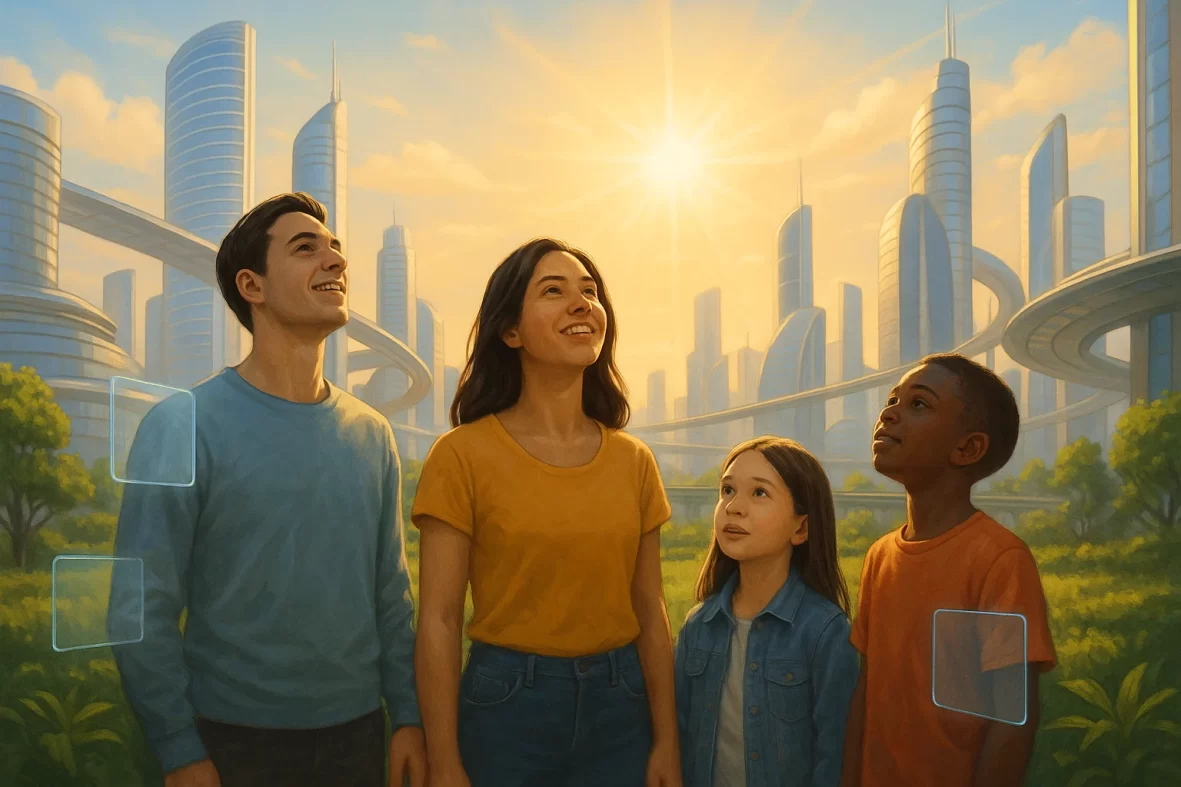Series: Technology and Ethics: A Biblical Worldview for the Digital Age
Scripture Focus: Romans 8:18
Theme: Restoration
Hope Beyond the Singularity
In 2023, Elon Musk announced that a human brain had successfully “tweeted” using Neuralink. A year later, Ray Kurzweil predicted we’d merge with AI by 2029. Meanwhile, Amazon rolled out predictive grief support powered by generative language models—and a sci-fi startup claimed to upload a dying grandmother’s consciousness into a simulated cloud.
Welcome to the “techno-future.”
For some, it’s utopia: a digital heaven of eternal life, on-demand knowledge, and virtual transcendence. For others, it’s dystopia: a post-human world where machines govern morality and humans become obsolete. But for Christians, the future is neither coded in Silicon Valley nor shadowed in doom—it’s anchored in something deeper. Not what man can build, but what Christ will restore.
The question is not, Will machines inherit the earth? but rather: Will we still believe the One who said, “Behold, I am making all things new” (Rev. 21:5)?
The Bible’s Vision of the Future
Paul’s words in Romans 8:18–25 ground Christian hope not in escape or enhancement, but in expectation. The groaning of creation is not the death rattle of a dying planet—it is the birth pain of a coming world.
For the anxious longing of the creation waits eagerly for the revealing of the sons of God. — Romans 8:19
Here’s the biblical vision of the future:
- Creation will be redeemed, not discarded (Rom. 8:21).
- The body will be raised, not replaced (1 Cor. 15:51–53).
- Christ will reign, not an algorithm (Dan. 2:44; Rev. 21:1–5).
- Our hope is not speculative but sure—“the blessed hope” of Christ’s appearing (Titus 2:13).
By contrast, secular futurism clings to fragile dreams: digital immortality, mind uploading, colonizing Mars. But these are echoes of Edenic longings with no Garden to return to—except in Christ.
Transhumanism envisions a synthetic salvation. Christianity proclaims a resurrected reality.
In the end, only one kingdom will stand—and it’s not made of code.
A Tale of Two Futures
Futurist Narratives Today:
- Utopia: AI cures death. Robots liberate labor. Mars becomes home.
- Dystopia: Deepfakes distort truth. Machines replace workers. Humanity loses meaning.
Both are built on human effort. Both fall short of divine restoration.
Instead of asking “How far can we go?” Scripture invites us to ask, “Where is God taking us?”
A Christian worldview sees technology as a tool, not a telos. We are not building Babel 2.0. We are waiting for the New Jerusalem.
As John Lennox (2020) wisely puts it: “The ultimate question is not what technology can do—but what humans ought to do, in light of who God is.”
How to Live with Hope in a Tech-Obsessed World
In a world where headlines trumpet innovation and warnings in equal measure, believers are called to be neither cynics nor idolaters—but stewards. Hopeful, humble, grounded.
Here’s how:
- Don’t fear the future—it belongs to Christ. “By Him all things hold together” (Col. 1:17).
- Innovate responsibly—technology is a tool, not a savior.
- Remember the real “upgrade”—not virtual reality, but glorified reality (1 Cor. 15:53).
As one theologian quipped:
“Christian hope isn’t found in becoming post-human. It’s found in being raised in Christ.”
We don’t look forward to escaping the body—we look forward to the resurrection of it.
Challenge to Action
The gospel calls us to be futurists of a different kind:
- Live counter-culturally—refuse the myth that salvation is just one update away.
- Tell a better story—when others dream of machines, declare the Messiah.
- Use your gifts for glory—whether coding, creating, designing, or healing, do it as a witness to the coming King.
You don’t need to fear what’s coming. You already know Who’s coming.
Series Navigation
← Previous: Ethics in a Digital Age
View All: Technology and Ethics Series Page
Key Takeaways
- Christian hope is not found in technology, but in the resurrection.
- The future is not ours to conquer—it is Christ’s to redeem.
- We are called to create, design, and build—but only as stewards of a world God will one day restore.
Live it out. Share the truth. Walk with courage.
References
- Heiser, M. S. (2015). The Unseen Realm: Recovering the Supernatural Worldview of the Bible. Lexham Press.
- Kurzweil, R. (2005). The Singularity Is Near: When Humans Transcend Biology. Viking.
- Lennox, J. (2020). 2084: Artificial Intelligence and the Future of Humanity. Zondervan.
- Reinke, T. (2022). God, Technology, and the Christian Life. Crossway.
- Vanhoozer, K. J. (2014). Faith Speaking Understanding: Performing the Drama of Doctrine. Westminster John Knox.
- Waters, B. (2006). From Human to Posthuman: Christian Theology and Technology in a Postmodern World. Ashgate.
- Wright, N. T. (2008). Surprised by Hope: Rethinking Heaven, the Resurrection, and the Mission of the Church. HarperOne.







